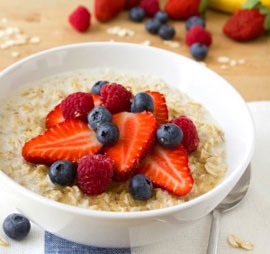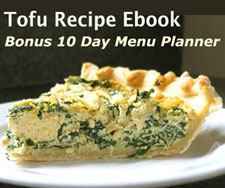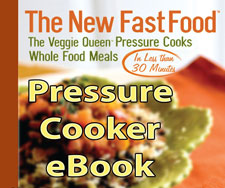
Vegetarians Eating Breakfast
Why a Healthy Breakfast is Important and How to Do It

Most of us know that eating breakfast is supposed to be a good thing, but time is the enemy of breakfast.
We eat breakfast on the go - e.g. a cup of coffee or a soda and/or a cereal bar in the car or bus or on a break.
We eat things we know we shouldn't because they're convenient and quick - or we don't eat at all.
How many of us grab a piece of fruit or toast to eat on the run in the morning, or even sit down to eat a bowl of cereal with milk? Not too many is my guess.
How many of us would you say cook a healthy breakfast for ourselves or our families? Many of us try but there's so little time! Getting kids to eat breakfast is something else.
It's shocking when you consider that breakfast is supposed to be the most important meal of the day.
Maybe knowing why we should eat breakfast could motivate us to make it a priority. We might even get up a few minutes early to squeeze breakfast into our busy schedules.
Why Breakfast Is the Most Important Meal of the Day:
1. Weight Loss:
- Many people think that if they skip breakfast, they'll end up eating less calories for the day, and get ahead in the weight loss game. But the opposite is true.
- When you don't feed your body after a long stretch of time without food, it thinks you're starving, lowers your metabolism to conserve energy, and holds on tight to the fat stores.
- By the time lunch time rolls around, your body is determined to grab as many calories as possible to avoid starvation, so you overeat.
- Then in the evening, your body does the sensible thing and prepares for another day without breakfast by prompting you to eat lots of high calorie foods.
2. Energy:
- Breakfast should set up our digestion for the rest of the day, raise our energy levels after a long fast, and sustain us through a busy morning until lunch.
- Going for lots of sugar & caffeine at breakfast time will cause a mid-morning blood sugar crash, requiring more sugar and caffeine.
- Unrefined, unprocessed whole grains, such as steel cut oats, quinoa, millet, or amaranth are the best source of energy because they're high in fiber and nutrients.
- They move slowly through the digestive system, releasing carbohydrates over time, for sustained energy without a blood sugar spike and crash.
- Protein with breakfast is also important to keep up your energy and avoid a mid-morning crash. Soy or dairy milk or yogurt will do the job, or some tofu or egg, nuts or nut butter.
3. Nutrition:
- Of course we all should pay attention to nutrition, but most vegetarians or vegans are health oriented, and may be more willing to consider a nutritious breakfast.
- When you don't eat breakfast, or eat empty calories for breakfast, it's hard to get all the nutrients you need to maintain good health. That's true for everyone, not just veggies.
- Later in the day, we're so hungry after not eating breakfast that we just want calories, lots of calories, fast. We can't take time to make sure we're eating something nutritious.
3 Steps to a Quick, Easy, Nourishing Breakfast:
1. Mix it Up!
Breakfast doesn't need to be big, but it should be nutrient dense, and have some variety.
Having the same thing for breakfast everyday is good in a way because it becomes part of our routine, and we get efficient at feeding ourselves in the morning.
But having a variety of foods means better nutrition and less boredom.
Don't think that you have to eat traditional breakfast foods either. Why not eat a savory breakfast, like noodles in miso broth, or the rest of last night's supper?
Left over anything is ideal for breakfast because it's already made!
2. Make it Nutritious:
Breakfast should include plenty of liquid, a balance of carbohydrates, fats and protein; vitamins, minerals & enzymes - and about 30% of daily calorie intake, according to 'Becoming Vegetarian' by Melina and Davis.
That means, if your ideal daily calorie intake is 1500, breakfast should be 450 calories.
What does a 450 calorie breakfast look like?
- An orange, a handful of almonds & a piece of whole grain toast with hummus.
- An apple plus a bowl of oatmeal with nuts, seeds, raisins & soy or almond milk.
- Scrambled tofu or refried beans in a tortilla with salsa and sour cream or avocado.
- A big smoothie with fruit, almond milk and protein powder and a piece of toast.
- Up the serving sizes or combine different options for more calories and more nutrition.
You'll get all the calories and nutrition you need for breakfast from whole foods: fruits and vegetables, nuts and seeds, beans & lentils, whole grains, dairy or egg for vegetarians.
3. Take it Easy:
Keep foods on hand that you can use for a quick breakfast:
Cooked whole grains such as steel cut oats, amaranth, millet, brown rice, quinoa all cook up quickly with milk, dried fruit and nuts into a nutritious breakfast.
You can throw a few cooked beans and barbecue sauce or salsa into brown rice and call it a Good Breakfast!
Put rolled oats or barley or quinoa flakes, nuts & seeds and dried fruit to soak in a food thermos with boiling water or milk the night before, for a nutritious instant breakfast.
Eggs or tofu can be cooked quickly or cooked ahead of time to eat with toast or a tortilla: Eggs or tofu scramble, frittata, or omelet, boiled eggs, baked or fried tofu, egg or tofu salad.
Refried beans, hummus, walnut olive spread, nut & seed butters are all good protein possibilities, and also fake meat breakfast sausages or deli slices.
Watch out for high sodium and fat in fake meat though! Homemade veggie burgers in your fridge or freezer might be better.
Sprouted grain breads are higher in protein, more nutritious and easier to digest than other breads, and more substantial. Commercial breads are often high in sugars and salt, so read labels and look for healthy options. You might pay more, but you'll get better nutrition.
Boxed whole grain cereals make a decent breakfast with milk, and fresh fruit such as banana or blueberries. Check the sugar & fat content when buying - they can be very high, and be sure that they are actually mostly whole grain.
Granola with unsweetened yogurt and fresh fruit is a breakfast classic, available in bulk bins at many natural food stores. If you have time, it's thriftier to make your own granola, you control the contents, and it's fresher.
A piece or two of fresh fruit or an avocado, and a handful of nuts and seeds is a great breakfast and it's portable.
Breakfast on the run can be an apple, some trail mix and a snack size soy milk - things you can eat with one hand while heading to class or work.
Make a batch of healthy muffins or breakfast cookies or pancakes on the weekend, and freeze them so you can grab one as you're running out the door.
Smoothies are a wonderful quick and easy breakfast. Plus, they go well in a travel cup. Some people like green smoothies, but I confess I like to chew my greens.
My daughter Sarah loves smoothies with protein powder. She says there are many brands and kinds, but to avoid heavily sweetened and flavored kinds, with little actual protein. E.g. she likes Gensoy which is non-gmo and widely available. You can also add nuts, nut butter or seeds to smoothies - or eat them on the side.
If You Aren't Hungry in the Morning:
We know that eating when you're not hungry isn't a good idea. Your digestion isn't primed for food, so you can't digest it well and get all the benefits. That leads to digestive problems and who knows what else!
So how can you eat breakfast if you're not hungry?
Here are a few suggestions to jump-start your digestion:
- Eat earlier and lighter at night
- Get up earlier
- Have a big cup of warm water shortly after getting up
- Do some light stretching exercises (yoga comes to mind), or go for a walk
- Eat something light, like fruit
- Have a nutritious mid-morning snack, such as granola and plain yogurt, or crackers and hummus, after your appetite wakes up
Judith Kingsbury, Savvy Vegetarian







